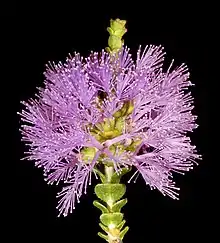Regelia ciliata
Regelia ciliata is a plant in the myrtle family, Myrtaceae and is endemic to the south-west of Western Australia. It is a rigid, spreading shrub with paper-like bark on the stems, tiny wedge shaped leaves and dense heads of mauve flowers in spring and summer.
| Regelia ciliata | |
|---|---|
 | |
| Scientific classification | |
| Kingdom: | Plantae |
| Clade: | Tracheophytes |
| Clade: | Angiosperms |
| Clade: | Eudicots |
| Clade: | Rosids |
| Order: | Myrtales |
| Family: | Myrtaceae |
| Genus: | Regelia |
| Species: | R. ciliata |
| Binomial name | |
| Regelia ciliata | |
| Synonyms | |
|
Melaleuca crossota Craven & R.D.Edwards | |
Description
Regelia ciliata is rigid, spreading shrub which grows to a height of 1.3–1.5 m (4–5 ft). The leaves are arranged in alternating pairs (decussate) so that they make four rows along the stems. They are broadly egg-shaped, about 6 mm (0.24 in) long and 4 mm (0.16 in) wide and fringed with short hairs.[2][3][4]
The flowers are mauve and arranged in dense heads 20–50 mm (0.8–2 in) across on the ends of branches which continue to grow after flowering. There are 5 sepals, 5 petals and 5 bundles of stamens. Flowering occurs over an extended period in spring and summer and is followed by fruit which are woody capsules in small, almost spherical clusters around the stem.[2][3][4]
Taxonomy and naming
Regelia ciliata was the first of its genus to be formally described. The description was written in 1843 by J.C.Schauer in the journal Linnaea: Ein Journal für die Botanik in ihrem ganzen Umfange.[5][6] The specific epithet (ciliata) is derived from the Latin word cilium meaning "eyelash"[7] in reference to the fringe of hairs on the leaves.[2]
Distribution and habitat
This regelia occurs in the Moore and Vasse River districts in the Avon Wheatbelt, Geraldton Sandplains, Jarrah Forest and Swan Coastal Plain biogeographic regions.[8] It grows in sand in areas that are wet in winter.[9]
Ecology
Regelia ciliata is a shallow-rooted species, tolerant of water-logged soils. It occurs on the Gnangara Groundwater Mound but as water is removed from this mound to supply water for Perth, the populations of this species are in decline. A similar effect has been observed in Astartea fascicularis, Hypocalymma angustifolium and Pericalymma ellipticum.[10]
Conservation
Regelia ciliata is classified as "not threatened" by the Western Australian government department of parks and wildlife.[8]
Use in horticulture
Regelia ciliata is a hardy plant, especially compared to others in the genus and has been grown successfully in eastern Australia. It can be propagated from seed which is released from the fruit a few days after removal from the plant, or from cuttings taken in autumn. It will grow in full sun or partial shade and responds well to annual pruning and addition of fertiliser.[2][11]
References
- "Regelia ciliata". Australian Plant Census. Retrieved 24 June 2019.
- Mullins, Effie. "Regelia ciliata". Australian National Botanic Garden. Retrieved 26 August 2015.
- "The genus Regelia". Australian Native Plants Society Australia. Retrieved 26 August 2015.
- Fagg, Murray. "Regelia ciliata" (PDF). Centre for Australian National Biodiversity Research. Retrieved 26 August 2015.
- "Regelia". APNI. Retrieved 26 August 2015.
- Schauer, Johannes Conrad (1843). "Genera Myrtacearum nova vel denuo recognita". Linnaea: Ein Journal für die Botanik in ihrem ganzen Umfange. 17: 243–244. Retrieved 26 August 2015.
- Moore, Bruce, ed. (2002). The Australian Oxford Dictionary (1999 ed.). South Melbourne, Vic.: Oxford University Press. p. 244. ISBN 0195507932.
- "Regelia ciliata". FloraBase. Retrieved 26 August 2015.
- Paczkowska, Grazyna; Chapman, Alex R. (2000). The Western Australian flora : a descriptive catalogue. Perth: Wildflower Society of Western Australia. p. 400. ISBN 0646402439.
- Groom, Philip K.; Froend, Ray H.; Mattiske, Elizabeth M.; Koch, Beverley (2000). "Myrtaceous shrub species respond to long-term decreasing groundwater levels on the Gnangara Groundwater Mound, northern Swan Coastal Plain". Journal of the Royal Society of Western Australia. 83: 75–82.
- Wrigley, John W.; Fagg, Murray (1983). Australian native plants : a manual for their propagation, cultivation and use in landscaping (2nd ed.). Sydney: Collins. p. 293. ISBN 0002165759.